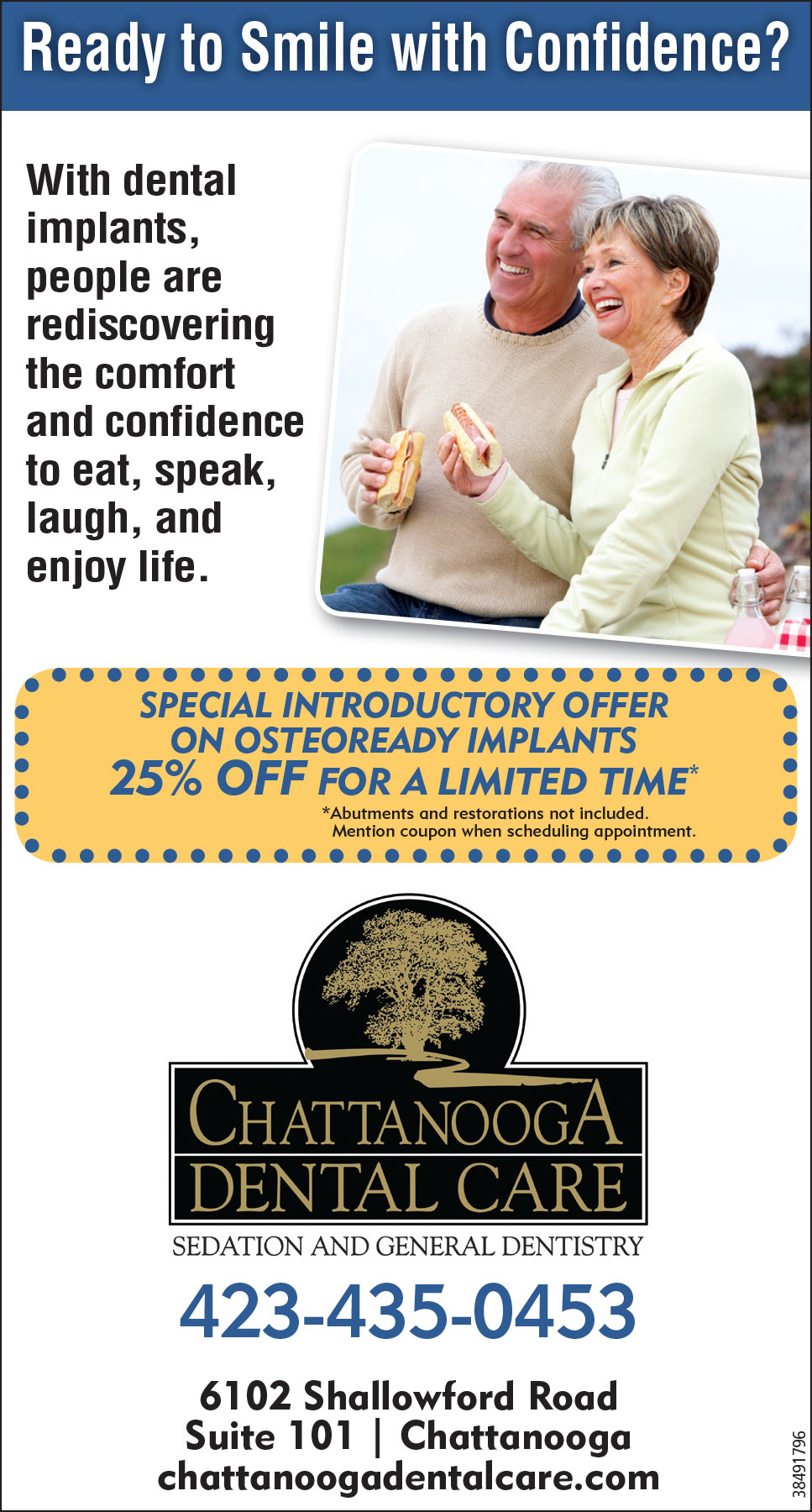Millions of Americans suffer tooth loss, mostly due to tooth decay, gum disease, or injury.
According to Dr. Austin Roberts at Chattanooga Dental Care, for many years, the only treatment options available for people with missing teeth were bridges and dentures. Today dental implants are available and may be the best restoration.
"Think of dental implants as being replacement tooth roots which provide a strong foundation for fixed (permanent) or removable replacement teeth that are made to match your natural teeth," Roberts explained. "Because it is not necessary to reduce other teeth to place an implant, more of your own teeth are left intact, improving your long-term oral health."
Individual implants also allow easier access between teeth, improving oral hygiene. Roberts explained that typically, a dental implant procedure begins with taking the necessary images (most often a 3-D scan that can be taken in-office) to assess the quality and quantity of bone in the proposed implant area.
"If there is enough bone, the procedure is very simple," he said. "Just like with a filling, we numb the area with local anesthetic. Once that is achieved, the site is prepared and the implant is placed."
The discomfort after an implant placement is less than that of a dental extraction, he added. Dental implants typically take three months to integrate and become one with the jawbone. For that time, dentists usually create a temporary appliance for patients so they do not have to be without teeth during that healing period. After three months, they bring the patient back in and begin to create their restoration, whether that be a single crown or a full arch of teeth, such as dentures.
Poorly fitting dentures may slide and can make chewing difficult or cause patients to muffle or slur words. Dental implants hold dentures firmly in place and eliminate the need for messy adhesives. Because they function like true teeth, patients can eat their favorite foods with confidence and without pain, Roberts noted.
"In most cases, anyone who is healthy enough to undergo a routine dental extraction or oral surgery can be considered for an implant," he said. "Patients should have healthy gums and enough bone to hold the implant."
A patient's ability to have the implant depends on certain health conditions such as diabetes, arthritis, osteoporosis and smoking, Roberts stressed.
"If a patient has any one of these items on their health history, the predictability of the implant being successful is lowered," he explained. "The other main limiting factor for dental implants is the availability of bone. Just about anyone of any age between 18 and 100 are candidates for dental implants given that they have enough bone to support the implant itself."
When it comes to cost and insurance coverage, dental implants are written into dental insurance plans just like other dental procedures, so it really depends on the policy itself. Roberts said he has found that some policies allow a benefit and some do not.
"As dental implants are becoming the standard of care in dentistry, for those policies that do not, we hope to see that change in time, as we believe dental implants to be the best replacement for a missing tooth," he said.
The care of a dental implant is very similar to the care of natural teeth. Brushing and flossing twice a day and keeping up with regular cleaning visits at the office will ensure that any issues are found and addressed quickly.
"I have been placing dental implants for four years now," Roberts said. "I graduated dental school four years ago, and in my senior year I was privileged to get chosen for an elective course in dental implants. Along with that course, a few other courses of advanced training in dental implants have been taken since my graduation. All of these courses, along with case studies amongst my colleagues, have helped provide predictable and accurate care to my patients that desire to have a dental implant."
Noteworthy:
"Think of dental implants as being replacement tooth roots which provide a strong foundation for fixed (permanent) or removable replacement teeth that are made to match your natural teeth," Dr. Austin Roberts of Chattanooga Dental Care explained. "Because it is not necessary to reduce other teeth to place an implant, more of your own teeth are left intact, improving your long-term oral health."
MORE INFORMATION
To learn more about dental implants, or to schedule a consultation today, visit chattanoogadentalcare.com or call 423-464-7657. Chattanooga Dental Care is located at 6102 Shallowford Road, Suite 101.

